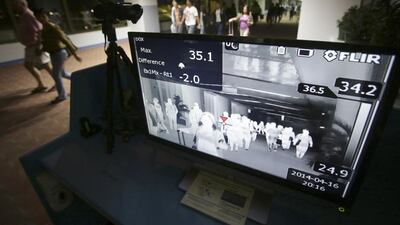GENEVA // Government authorities and international health experts are to meet tomorrow to decide whether the deadly Mers coronavirus is a “public health emergency of international concern”.
The World Health Organisation has organised the meeting in Geneva for its experts and representatives of affected countries.
Middle East Respiratory Syndrome has infected at least 536 people and killed 145 since its first known case was discovered in 2012.
Eighteen countries have reported cases, but no further transmission has been documented from recent cases in Greece, Egypt, Jordan, Malaysia, the Philippines and the US, the WHO says.
There is no evidence of sustained transmission from person to person in communities, it has said.
Governments in the region have made “huge efforts” to share information and try to understand how the virus is being transmitted, said Rana Sidani, spokeswoman for the WHO’s Eastern Mediterranean office.
“Until we discover how the virus transmits to humans we are likely to see more cases,” Ms Sidani said.
“But definitely we were concerned because the number of cases has risen and new countries have been affected. New cases have been exported from countries that have had the disease.”
The WHO’s emergency committee will advise its director general on whether Mers constitutes a public health emergency of international concern, and whether to issue temporary recommendations to prevent the disease from spreading.
International health regulations define such an emergency as an extraordinary event that constitutes a public health risk to other WHO member states through international spread of the disease, and which could require a coordinated international response.
These regulations went into force in 2007. The emergency committee has only been used so far for Mers and H1N1, the 2009 pandemic strain of influenza.
H1N1 is the only disease that the WHO has named a public health risk of international concern. It left more than 18,000 dead from infections in more than 214 countries and territories.
The number of Mers cases has almost doubled in recent months, with by far the most being in Saudi Arabia.
The kingdom has counted 480 laboratory-confirmed cases, with 139 deaths, as of Sunday.
The UAE has had 37 lab-confirmed Mers cases since late March, all in Abu Dhabi emirate, with more than two thirds being healthcare workers. Most of those recently infected had mild or no symptoms.
Despite the recent rise in cases, Mers seems to be contagious only to a limited extent, not passing easily from person to person unless through close contact, the WHO says.
The organisation’s mission to Jeddah found the outbreak there was caused by an increase in the number of primary cases, possibly seasonal, coupled with inadequate infection prevention and control measures.
One explanation for a seasonal increase could be related to the weaning of young camels from their mothers in the spring, the WHO said in its May 9 risk assessment report.
Recent studies have suggested that camels are a probable source of infection in humans. Researchers have matched human strains of Mers to those found in camels in Egypt, Qatar and Saudi Arabia.
But much remains unclear about the possible connection, said Ms Sidani. “We know it has a role but there is an information gap into what is the direct cause of this transmission,” she said, adding that other animals could also play a part.
Health authorities must also determine the transmission mode from humans to humans, although it is probably passed only through very close contact with an infected person or respiratory droplets, Ms Sidani said.
The Saudi ministry of agriculture on Sunday urged people dealing with camels to “exercise caution”.
The ministry advised people to wear protective gear such as masks and gloves when dealing with the animals, especially during birth or with sick or dead animals, and wash their hands after touching them, the Saudi Press Agency reported.
Mers symptoms include fever, shortness of breath and coughing. People with underlying conditions or chronic diseases seem to be more prone to developing more severe conditions, such as renal failure and pneumonia.
More information about Mers and tips on prevention are available at www.haad.ae.
lcarroll@thenational.ae

